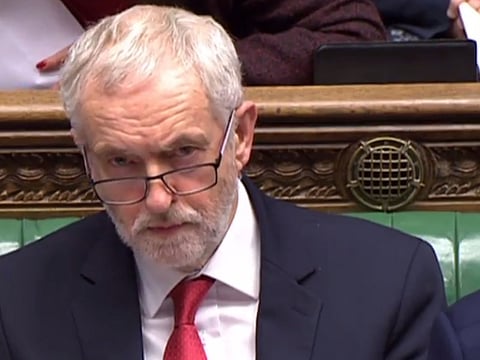On Brexit, Corbyn must lead from the front
The Labour leader has a duty to join O’Grady in sounding the alarm about where the Tories are taking Britain

If the United Kingdom gets a bad Brexit deal — as it surely will, unless the whole mad escapade is stopped — business will be put out. But ultimately, big companies can just shift investment offshore. Workers, though, are all in. They will be stuck with a low- investment, low-productivity, low-wage economy. That means low-quality jobs. They won’t even be able to move offshore, because we won’t have free movement.
The trade union movement realises this. Frances O’Grady hasn’t been hoodwinked by Prime Minister Theresa May’s deal with the European Union (EU) in recent weeks. The British Trades Union Congress (TUC) general secretary knows that it doesn’t mean we’re staying in the EU’s single market, which helps underpin investment in our industry and our prosperity. Rather, it means we are heading for, at best, a free-trade agreement with the EU a bit like one the bloc has with Canada.
Such a deal would do virtually nothing for our services industries, which account for 80 per cent of Britain’s economy. That’s why O’Grady says it would be a “disaster for Britain’s workers”. Her warnings are backed up by research from the Rand Corporation which concluded that the UK will be “economically worse off outside of the EU under most plausible scenarios”.
Although the TUC general secretary is sounding the alarm, the Labour Party isn’t yet willing to say Britain should stay in the single market. It has, admittedly, shifted quite a bit in that direction since the election — and there was a further move when Keir Starmer, the party’s Brexit spokesperson, said Labour backed a “single market variant” (which means paying money to the EU for future access to its market), and would even go along with “easy” movement of people — if not the “free” movement that underpins the single market.
But Labour Party leader Jeremy Corbyn is not yet willing to nail his colours to the single-market mast. He knows that some of his most enthusiastic young supporters, as well as many activists in big cities, are ardently pro-European. But he is also worried that many working-class voters in the party’s post-industrial heartlands in the north of England and the Midlands are pro-Brexit. Corbyn’s team, therefore, still seems to want to maintain “constructive ambiguity” over Labour’s policy on Brexit — in a bid to be all things to all people.
Such a strategy worked well during the election, with many pro-European voters either believing Labour was more anti-Brexit than it really was, or at least thinking it had better European policies than the Tories.
O’Grady needs to persuade the Labour leadership that such a timid approach is wrong. Corbyn should launch a full-throated campaign spelling out the dangers of a Tory Brexit to working people. He should explain how the government is hiding the truth of what it is planning from the people because it is worried they will take fright.
If the Labour leader fights arm in arm with the trade union movement, he has the capacity to shift the opinion of working people. And if he does that, he will no longer find he is pulled in different directions by his two most important bases — metropolitan centres and the old Labour heartlands.
Leadership is about shaping opinion, not just reflecting it. Corbyn has a duty to join O’Grady in sounding the alarm about where the Tories are taking Britain. If he does this, he will be able to mobilise parts of the electorate that are lukewarm about Labour. But if he doesn’t fight hard, there’s a risk that when the horrors of the full English Brexit become clear, and workers realise they’ve provided the bacon, Corbyn will get a big share of the blame.
— Guardian News & Media Ltd
Hugo Dixon is editor-in-chief of the pro-European website InFacts.


